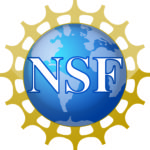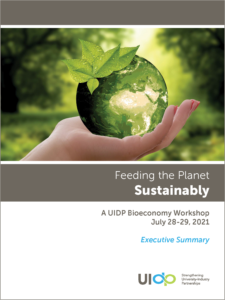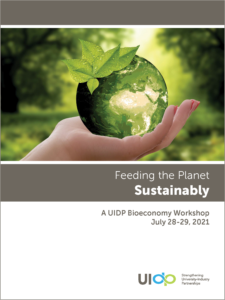Innovation in the Bioeconomy | Feeding the Planet Sustainably
Workshops to catalyze translation and partnerships
 Sponsored by the National Science Foundation, award #2137471
Sponsored by the National Science Foundation, award #2137471
Held July 28-29, 2021
In the coming decades, agriculture will need major advances to meet the food, feed, fiber, and fuel demands of the growing population while reducing its environmental footprint. Within this context, there is an urgent and critical need to establish an agricultural bioeconomy that is sustainable, productive, and resilient to change.
Accordingly, the National Science Foundation (NSF) is making investments to identify needed technological advances and develop partnerships to advance a new agriculture that can sustainably feed the changing planet. This workshop was convened by UIDP on behalf of the NSF Biology Directorate to identify partnership strategies for how use-inspired research can be rapidly translated to innovations that support a new agricultural bioeconomy.
See the executive summary for workshop key findings, challenges and opportunities, as well as recommendations and next steps to accelerate scientific and technological advances. The report also includes narrative descriptions of sessions, key takeaways from topical breakouts, and an overview of the research landscape by Elsevier.
UIDP would like to thank the National Science Foundation (NSF), and specifically the Division of Molecular and Cellular Biosciences (MCB), for its financial investment in this workshop. We would like to specifically thank Todd Jones (director of crop genome engineering at Corteva Agriscience), Jan Leach (associate dean for research for the College of Agricultural Sciences at Colorado State University), and Wayne Parrott (distinguished research professor from the Department of Crop and Soil Sciences at University of Georgia), for serving as technical advisors. Natalie Clark, postdoctoral research associate at Iowa State University, served as the workshop consultant as well as the lead author of this report.
Download the materials for Feeding the Planet Sustainably, the first workshop in this series, below.
Presentations
Additional Reading
The Research Landscape for Feeding the Planet Sustainably, Elsevier Analytical Services
This work was commissioned to provide insight into research that has been conducted towards the goal Feeding the Planet Sustainably overall and specifically within fields related to biotechnology and agriculture. The analyses will endeavor to provide insight into how much research has been done, who the global leaders in the research areas are, what sectors are leading the research, and how the research is being used to support other research and innovations.
See event information for other workshops in this series
World without Waste, August 19-20, 2021
Mitigating Climate Change, Oct. 12-13, 2021




